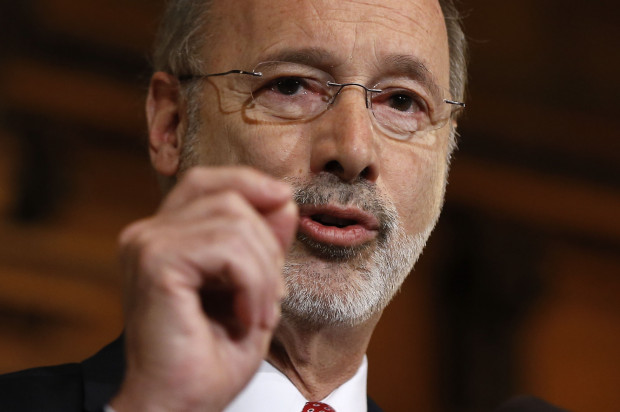In vetoing plastic bag bill, Wolf cites Environmental Rights Amendment

AP Photo/Matt Rourke, File
Gov. Tom Wolf, in this Dec., 2015 file photo, said a plastic bag bill would have violated the Environmental Rights Amendment to the Pennsylvania Constitution. File
Pennsylvania Gov. Tom Wolf on Friday vetoed a bill that would have curbed the right of towns and cities to regulate use of plastic shopping bags, saying it would have violated the Environmental Rights Amendment of the state Constitution.
His use of the Amendment as justification for the veto follows a landmark ruling by the state Supreme Court last week saying that the measure must be the guiding principle of state policy on the preservation of natural resources.
The bill would have prevented municipalities from banning or taxing bags in an effort to reduce waste and cut down on fossil fuel use. It was supported by the plastic bag industry and by lawmakers in both parties but opposed by environmentalists and advocates for local self government.
Wolf previously signaled he would veto the bill, HB 1071, but until Friday did not say why.
In a statement, he said the constitutional amendment applies to all levels of government.
“The prohibition under this bill, therefore, is not consistent with the rights vested by the Environmental Rights Amendment of the Pennsylvania Constitution, and the duties upon all government actors, including towns and cities,” Wolf said.
Echoing the wording of the Supreme Court’s June 20 ruling, he said the amendment means that government at all levels is required to prevent unreasonable “degradation, diminution, or depletion” of water, air or land.
Wolf also backed cities such as Philadelphia, which opposed the bill on the grounds that it would have limited their ability to set policy on matters of legitimate municipal concern. No Pennsylvania city currently has a tax or a ban on bag sales, but advocates for such measures say that about 160 U.S. cities outside the state have enacted bag-curbing measures of some kind.
The bill would have significantly pre-empted cities’ ability to make their own policy on bags, Wolf said.
“This policy supporting this preemption is misguided and should not become the law of this Commonwealth,” Wolf said.
The statement prompted a protest by Novolex, a plastic bag manufacturer in Milesburg, Centre County, whose state Democratic Representative, Mike Hanna, was a leading sponsor of the bill.
“It is a shame that Gov. Wolf decided to veto a common-sense, bipartisan bill that would have helped protect good-paying jobs in the state,” the company said in a statement. “Our facility in Milesburg, which employs more than 160 workers, would be well served with some certainty that its own state isn’t going to harm its ability to operate.”
The American Progressive Bag Alliance, a trade group, said about 1,500 jobs across the state could be affected now that cities are allowed to make their own bag-reducing measures.
“We had hoped that Gov. Wolf would have listened to the voices of the 1,500 individuals who work in the 14 manufacturing plants that make and distribute plastic bags in Pennsylvania,” said Matt Seaholm, executive director of the alliance, in a statement.
Seaholm accused Wolf of ignoring lawmakers in both parties who passed the bill in both houses, and to its sponsors who “worked across party lines” to write the legislation.
The Supreme Court’s ruling was hailed by environmentalists as an important victory, and one that will force state agencies to act as a trustee of natural resources such as public lands or natural gas reserves, rather than an owner.
















